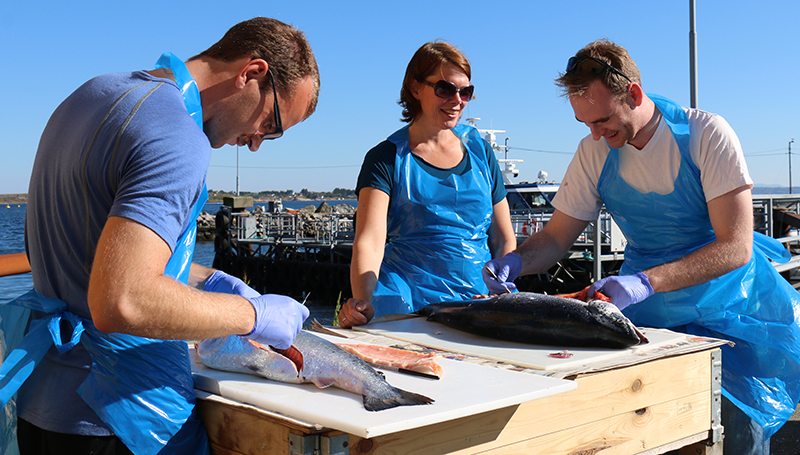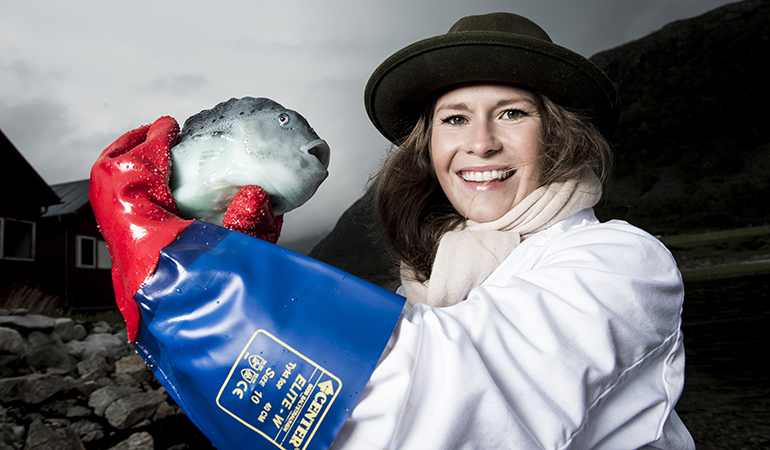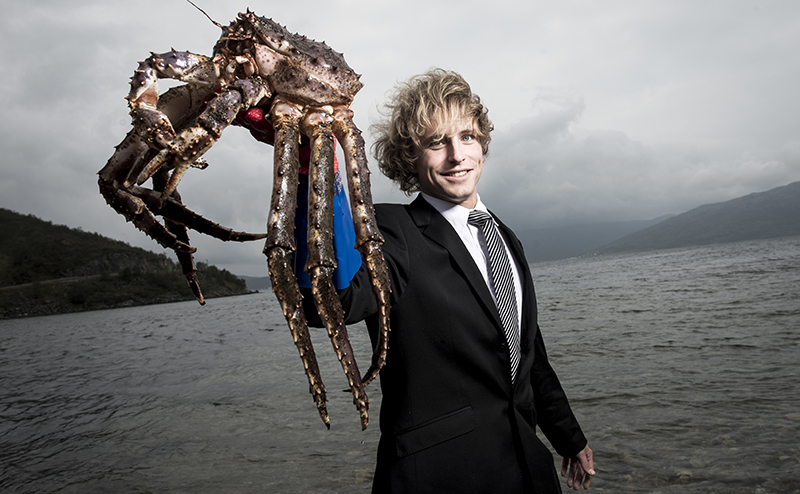Tromsø
Nordic applicants: 1 March 2026 (No admission in 2025)
EU/EEA + Swiss applicants: 1 March 2026 (No admission in 2025)
Non-EU/EEA applicants: No admission
Ocean Leadership is a part-time executive master’s program for professionals in marine or maritime sectors. The transdisciplinary program provides an understanding of the complex landscape of ocean challenges and builds the knowledge, skills, and capacity necessary to lead sustainable and integrative solutions.
Increasing demands on marine resources combined with increasing pressure from global challenges such as climate change, pollution, biodiversity loss and inequity currently threaten the oceans.
To ensure sustainability and resilience, there is a need for developing and using solutions that take advantage of the opportunities of the blue economy and address these challenges. This requires leaders with an ability to navigate conflicting values and to integrate knowledge and action across different scientific disciplines, marine sectors, and levels of governance. These leaders must be able to engage effectively with cutting edge information and communication technologies (ICT).
The Ocean Leadership program builds awareness of interconnected ocean challenges and nurtures the development of creative solutions to address them. The program supports leaders in contributing to a shift towards sustainable oceans.
This study programme requires compulsory attendance to the introductory meeting. See this web page for more information.Fern Wickson
Professor of Ocean Leadership
Kåre Nolde Nielsen
Forsker, forskningsgruppeleder
The Ocean Leadership program aims to strengthen strategic competences in leading the development and implementation of integrative sustainability solutions for the ocean.
The program is open to professionals working in any marine or maritime sector, from industry, government, or civil society. Applicants need to have at least 2 years leadership experience, but this can be at any level.
As a transdisciplinary executive master that is targeting multiple sectors, the program will bring together a novel network of established and emerging ocean leaders. Through problem- and solution-based learning, participants will build knowledge, skills and capacities that are directly relevant to their current work environment, ensuring impact and a return on investment for the employer.
The program runs part-time over three years. The first two years are focused on course work, with a combination of face-to-face sessions, digital discussion seminars, and online course modules for independent study. The third year is dedicated to the development of a master’s project on a topic of relevance to the participants’ work environment and mentored by a skilled supervisory team.
Through the course work, participants will develop relevant knowledge and skills across the domains of leadership and sustainability, ocean law and governance, digitalisation and innovation. Emphasis will be placed on developing collaborative, adaptive and transformational styles of leadership; understanding important global sustainability challenges; facilitating creativity and responsibility in blue/green innovation; participating in governance of the sea at local, regional, and international levels; and engaging with digitalisation in ethical and impactful ways.
The Ocean Leadership Executive Master does not provide sufficient credits to pursue a PhD program.
A candidate who has completed their qualification should have the following learning outcomes defined in terms of knowledge, skills, and general competence and attitudes:
Knowledge:
Upon completing the Ocean Leadership program, participants will have:
- advanced knowledge of sustainability challenges
- substantial insight into ocean law and governance
- information and data literacy relevant for ocean leadership
- specialized knowledge of different approaches to leadership for advancing ocean sustainability
- solid understanding of the need for and challenges associated with bringing together diverse types of knowledge and stakeholders
Skills:
Upon completing the Ocean Leadership program, participants will be able to:
- critically assess and use diverse sources of information
- identify and apply relevant theories and methods to analyze practical problems
- envision creative solutions to complex problems
- facilitate teamwork to develop and advance common goals
- plan and implement independent, applied projects in accordance with applicable norms
- communicate effectively with different target audiences
General competence and attitudes:
Upon completing the Ocean Leadership program, participant will be able to:
- value and advance sustainability and equity
- acknowledge and act in the face of complexity
- develop and implement integrative and inclusive problem-solving
- anticipate and attend to emerging futures in a changing world
- recognize and realize their potential to be inspiring and innovative agents of change
Semester 1: SVF-3401 Introduction to Ocean Leadership for Sustainability (15 STP/ECTS)
Semester 2: SVF-3402 Critical Global Challenges (15 STP/ECTS)
Semester 3: SVF- 3403 Blue Innovation for the Green Shift (15 STP/ECTS)
Semester 4: SVF- 3404 Ocean Futures (15 STP/ECTS)
Semester 5: SVF- 3409 Ocean Leadership Master's Project (15 STP/ECTS)
Semester 6: SVF- 3409 Ocean Leadership Master's Project (15 STP/ECTS)
Admissions every other year (next 2026, 2028 etc.)
Basic academic requirements
Applicants must document a completed bachelor’s degree (180 ECTS), or an equivalent qualification.
For degrees issued in Norway, Europe, Canada, USA, Australia & New Zealand: an average grade C is the minimum requirement, or the corresponding numerical mark/percentage score to be eligible for admission to master's level study programs.
For degrees issued in other than the above-mentioned countries: an average grade B as a minimum requirement, or the corresponding numerical mark/percentage score to be eligible for admission to master's level study programs.
Applicants must have a minimum grade average comparable to a Norwegian C (2,5 eller 3,0)* in the ECTS scale.
Additional requirements
The target group of the program is people in leadership positions in government agencies, industry and/or civil society engaged in marine or maritime affairs. A minimum of 2 years of leadership experience (at any level) is required, and at least 5 years of work practice following graduation.
Practice must be documented with a dated and signed certificate of service from the employer. The certificate must contain the type and size of the position, as well as the start and end date.
Application deadlines:
Nordic applicants: March 1st - Her finner du all informasjon knyttet til søking og opptak
EU/EEA and Swiss applicants: March 1st You will find more information about admission here
Non-EU/EEA applicants: No admission
You can apply as a Nordic applicant if you have upper secondary school (Higher Education Entrance Qualification) from a Nordic country (Norway, Faroe Islands, Finland, Iceland, Greenland, Sweden or Denmark). People from non-Nordic countries can also apply in the Nordic admission as long as they meet the Norwegian and English language requirements for higher education.
Applicants with education from non-Nordic countries must document English language proficiency. You will find more information of English language requirements here.
Capacity: 20 students. Admissions every other year (next 2026, 2028 etc.)
The Ocean Leadership program involves 4 semesters of course work, and 2 semesters of master's project work.
The mandatory courses for this degree are: Introduction to Ocean Leadership for Sustainability, Critical Global Challenges, Blue Innovation for the Green Shift, and Ocean Futures.
The courses are taught through a combination of face-to-face intensive sessions, online modules for independent study, and digital discussion seminars.
For the coursework component, each semester will involve two face-to-face intensive sessions - one at the start and one toward the end of semester. Each of these intensive sessions will run for 4.5 days and will be held in Tromsø (or another European location of significance for ocean science, industry, or governance).
In addition to the face-to-face intensives, each course will have online modules that participants complete independently. The materials in these modules can contain a mix of readings, videos (e.g., short lectures, instructional films, interviews, or inspirational talks), websites, podcasts, activities and/or quizzes. Short digital discussion seminars will also be held to discuss course materials (particularly in the context of participants’ own working environment), and/or provide feedback on assignments in development.
The master's project component of the program will be undertaken independently under the guidance of a skilled supervisory team but will also include a small number of online discussion seminars to provide additional contact and guidance within the group.
Each course description specifies the means that will be used to assess its stated learning objectives, which may include written assignments, project-based tasks, group work, and/or presentations in various formats.
English
Read more about the studies we offer in our digital brochure
Read more about the studies we offer in our digital brochure.
Other studies you may like

( Tromsø )
Akvamedisin UiT. Autorisasjon som fiskehelsebiolog gir deg rett til å diagnostisere og behandle syk ...

( Tromsø, )
Med bachelor i fiskeri- og havbruksvitenskap kan du være med på å utvikle og realisere fremtidens ma...

( Tromsø )
Med master i fiskeri- og havbruksvitenskap blir du fiskerikandidat. Jobb innen ledelse, produksjon, ...